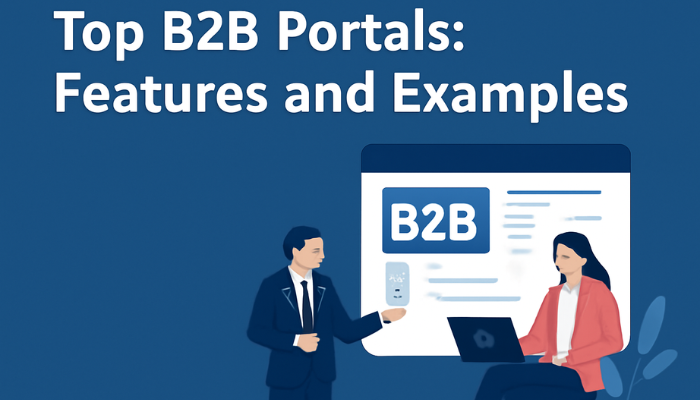You’re a business owner handling hundreds of deals, suppliers, and partners. Your team is stretched thin, and every day, there’s a new challenge. Finding the right suppliers, negotiating prices, managing inventory, but how do you keep it all in check without running into delays and extra costs?
This is the reality for many large businesses. The supply chain is complicated, and the wrong tools or partners can slow everything down. But what if you could access a platform that simplifies all of this? A place where you can easily connect with reliable suppliers, manage orders without the constant back-and-forth, and scale your business seamlessly.
In this blog, we will read about the top B2B portals that can actually help solve these everyday problems for large businesses like yours. We’ll break down what each one offers and show you which features matter most to keep your operations running smoothly.
What are B2B Portals?
B2B portals, or Business-to-Business portals, are online platforms designed to facilitate transactions, communication, and collaboration between businesses. These portals act as digital marketplaces where companies can connect with suppliers, manufacturers, wholesalers, and service providers. They streamline the entire process, from sourcing products to managing orders, and even handling payments, all in one place.
For large businesses, the value of B2B portals extends far beyond simple transactions.
Also Read: Guide on Steps of B2B Web Portal Development
Now that we’ve covered what B2B portals are, let’s take a closer look at the key benefits they bring to the table for large businesses.
Benefits of B2B Portals
B2B portals offer businesses a simple way to streamline operations, reduce costs, and improve collaboration. From easier supplier connections to better data insights, these platforms help businesses stay efficient and competitive.
Let’s look at the key benefits:
Improved Efficiency
One of the most significant advantages of B2B portals is the improvement in operational efficiency. Traditionally, managing suppliers, orders, and procurement required a lot of time-consuming manual effort. But B2B portals automate many of these processes, helping businesses streamline operations.
- Order Processing Automation: Once a purchase order is made, the portal automatically processes it, updating inventory levels, sending order confirmations, and initiating shipment processes. This cuts down on human intervention and drastically speeds up the entire supply chain.
- Invoicing and Payment Processing: B2B portals also automate invoicing, which reduces the risk of errors and ensures timely payments. Integrated payment gateways allow for secure transactions, simplifying the payment process.
- Inventory Management: Through real-time updates and data synchronization, businesses can keep track of inventory without manually updating records. This reduces stockouts, excess inventory, and costly mistakes.
Enhanced Collaboration and Communication
Effective communication between suppliers and buyers is crucial for large businesses. B2B portals provide a centralized platform for businesses to communicate with their suppliers and partners.
- Direct Communication: Through integrated messaging features, businesses can directly contact suppliers, discuss specifications, negotiate pricing, and resolve issues in real-time.
- Document Sharing: Many portals allow businesses to upload and share important documents such as contracts, invoices, purchase orders, and technical specifications. This makes document management easier and ensures everyone has access to the same information.
- Faster Decision-Making: With a direct line of communication and instant access to relevant data, decisions are made faster. This results in quicker responses to market changes and faster turnaround times for orders and deliveries.
Access to a Global Marketplace
One of the key advantages of using a B2B portal is the ability to connect with businesses worldwide. Many platforms have an international reach, allowing you to expand your network and build relationships with suppliers and buyers from other countries.
- Global Supplier Network: B2B portals give businesses the ability to tap into a wider pool of suppliers from around the world. This means more options for sourcing materials, products, and services, often at better prices.
- Cross-border Trade: By enabling international transactions and currency exchange, these platforms break down geographical barriers. This opens the door to global markets and new business opportunities.
- Diverse Product Range: From raw materials to finished goods, B2B platforms feature a wide range of products, offering companies more variety when sourcing for specific needs. With this vast network, businesses can always find what they need, when they need it.
Cost Savings
Cutting costs is always a top priority for large businesses, and B2B portals can help reduce costs across multiple areas:
- Eliminating Middlemen: Traditionally, businesses often had to go through intermediaries to reach suppliers or buyers, which added extra costs. B2B portals allow for direct transactions, cutting out the middlemen and reducing overhead.
- Bulk Discounts: Many B2B platforms enable businesses to purchase in bulk, allowing them to take advantage of discounted pricing. This is particularly helpful for large businesses looking to purchase raw materials or products in large quantities.
- Shipping Efficiency: By integrating logistics solutions into the portal, businesses can save on shipping costs. Many B2B portals offer tools that calculate the most cost-effective shipping methods based on weight, destination, and urgency.
Better Data and Insights
Data-driven decisions are essential for large businesses, and B2B portals provide businesses with real-time insights that help make better decisions.
- Real-Time Tracking: With built-in tracking features, businesses can monitor the status of their orders, shipments, and payments in real-time. This allows for better inventory management and ensures that the supply chain remains optimized.
- Performance Analytics: Many platforms provide analytical tools that track supplier performance, order history, and purchasing trends. This allows businesses to evaluate their suppliers and make informed decisions about who to continue working with.
- Market Trends: By tracking product demand, pricing trends, and supplier availability, businesses can predict market fluctuations and adjust their strategies accordingly. This helps companies stay ahead of competitors and reduce risks.
With Codewave, develop your B2B portal at 30% reduced cost, 3X faster, and with 24/7 customer service automation.
Let’s build your B2B portal now →
Now that we’ve covered the benefits, let’s look at the key features that make B2B portals essential for large businesses.
Key Features of B2B Portals
These are the features that directly help businesses improve operations, save time, and scale effectively.
| Feature | Why It Matters |
| Supplier Verification | B2B portals ensure you’re working with reliable, verified suppliers. This reduces the risk of fraud or poor-quality products, saving you time and money by avoiding returns and disputes. With clear certifications and reviews, you can confidently choose the right partners. |
| Real-Time Order Tracking | Staying updated on where your orders are and when they’ll arrive is crucial for large operations. Real-time tracking keeps you informed at every step of the supply chain, helping you plan better, avoid delays, and improve customer satisfaction. |
| Customizable Dashboards | B2B portals often let you personalize your dashboard to focus on the data that matters most to your business—whether that’s sales numbers, supplier performance, or inventory levels. Custom views make decision-making quicker and easier, especially when managing multiple suppliers or large-scale operations. |
| Integrated Payment Systems | Having secure, built-in payment options makes financial transactions easier and safer. You can handle multi-currency payments, track invoices, and ensure timely payments—all without leaving the platform. This helps improve cash flow management and reduces the chances of errors or fraud. |
| Bulk Ordering Options | When you’re purchasing in large quantities, you need a platform that supports bulk orders. B2B portals let you place large orders easily, and many offer discounts for high-volume purchases. This not only saves you money but also makes managing inventory more efficient. |
| Automated Invoicing and Billing | B2B portals automatically generate invoices when orders are placed, helping you avoid manual errors and delays. This speeds up the payment cycle and ensures you have accurate records for accounting and audits, saving both time and effort in financial management. |
| Advanced Analytics Tools | With B2B portals, you get access to data-driven insights on supplier performance, market trends, and purchasing history. These analytics help you identify the best suppliers, predict demand, and make smarter purchasing decisions that can lower costs and improve efficiency. |
| Multi-Language & Currency Support | Expanding globally? B2B portals make it easier to connect with suppliers worldwide by supporting multiple languages and currencies. This feature removes language barriers and simplifies international trade, making it easier to do business with partners across different regions. |
With these features in mind, it’s clear that the right B2B portal can simplify operations, and save your business both time and money.
Already running a successful business? Connect with top eCommerce consultants who can take you further.
Check out our guide to the best consultants for hire in the USA!
But with so many platforms available, which ones should you be focusing on? To help you make an informed choice, let’s take a look at some of the top B2B portals.
Examples of Top B2B Portals
You’ve probably heard of the big names in B2B portals, but let’s take a deeper look at a few that stand out in the market. These platforms are not just popular, they’re trusted by businesses worldwide to simplify sourcing, improve communication, and drive growth.
1. Alibaba.com
Alibaba.com is one of the largest and most popular B2B platforms in the world, connecting businesses with suppliers across the globe. Headquartered in China, it offers a vast marketplace where companies can find products ranging from raw materials to finished goods.
Whether you’re looking to source electronics, textiles, machinery, or just about anything else, Alibaba can help connect you with suppliers worldwide. The platform makes it easier to manage global trade, with tools for payment security, logistics, and supplier verification.
Key Features of Alibaba.com
- Supplier Verification: Alibaba offers various verification levels, including Gold Supplier and Verified Supplier statuses. These features give businesses confidence that they’re working with trusted suppliers, ensuring reliability in every transaction.
- Trade Assurance: The Trade Assurance program offers protection by ensuring a refund if the supplier fails to meet the terms of the contract. This adds a layer of security to the process, making it easier to trust the transactions on the platform.
- Global Sourcing and Logistics: Alibaba simplifies sourcing products from different parts of the world and provides integrated logistics services. From shipping to customs clearance, Alibaba streamlines the logistics process, saving you time and effort.
- Custom Orders: Alibaba allows businesses to place customized orders, whether it’s adjusting product designs or meeting specific material requirements. This flexibility makes it easier to source products that fit your exact needs.
- Bulk Ordering Discounts: Purchasing in bulk often leads to discounts on prices. Alibaba’s platform encourages large orders, offering significant savings for those looking to stock up or scale their operations.
Pros and Cons of Alibaba.com
| Pros | Cons |
| Wide Supplier Network: Access to thousands of suppliers from around the world. | Language Barriers: Communication can be challenging with some suppliers due to language differences. |
| Transparency: Supplier profiles are detailed, showing ratings, certifications, and reviews. | Shipping Costs: International shipping can add up, and costs aren’t always clear from the start. |
| Bulk Discounts: Large orders often come with substantial price reductions. | Quality Control: Ensuring consistent product quality across suppliers can be tricky without in-person checks. |
| Trade Assurance: Payment protection for transactions, reducing the risk of fraud. | Long Shipping Times: Shipping from overseas can take time, which may affect delivery schedules. |
| Global Reach: Source products from virtually anywhere, expanding your supplier options. | Customization Challenges: Adjusting products to exact specifications can sometimes be complex and time-consuming. |
2. Thomasnet
Thomasnet is a leading B2B platform focused specifically on the U.S. industrial market. It’s an essential resource for businesses looking to connect with manufacturers, suppliers, and service providers in industries like manufacturing, construction, aerospace, and more.
Unlike global platforms like Alibaba, Thomasnet is centered around providing a comprehensive directory of U.S.-based suppliers, which makes it especially useful for sourcing materials and parts locally.
Key Features of Thomasnet
- Comprehensive Supplier Directory: Thomasnet offers a detailed directory of over 500,000 suppliers in the U.S., allowing businesses to search by industry, product, or service. This helps ensure that businesses can find exactly what they need, whether it’s a specific part or a large-scale supplier.
- CAD Drawings & Product Specifications: For manufacturers and engineers, Thomasnet provides access to CAD drawings and detailed product specifications, helping businesses evaluate suppliers and products before making any purchases. This feature ensures that businesses can get a clear picture of what they are ordering.
- RFQ (Request for Quote): Businesses can submit RFQs directly through the platform, making it easier to compare prices and services from multiple suppliers at once. This is especially valuable for large orders or complex products that require precise pricing.
- Supplier Reviews & Ratings: Thomasnet includes customer reviews and ratings for suppliers, helping businesses make decisions based on real-world feedback. This transparency increases trust in the platform and reduces the risk of working with unreliable suppliers.
- Customizable Search Tools: With customizable search filters, businesses can quickly find suppliers that match their specific needs. Whether it’s searching by product, certification, or location, Thomasnet makes it easy to narrow down options and find the best fit.
Pros and Cons of Thomasnet
| Pros | Cons |
| U.S.-centric: Focused on connecting businesses with suppliers in the U.S. | Limited Global Reach: Primarily focuses on U.S. suppliers, limiting international sourcing options. |
| Detailed Product Information: Access to CAD drawings and product specs for easy evaluation. | Complex Interface: Some users find the platform’s interface a bit overwhelming due to its extensive features. |
| RFQ Feature: Easily request quotes from multiple suppliers at once. | Supplier Listings May Vary: While comprehensive, not all suppliers may provide complete or up-to-date information. |
| Verified Suppliers: Includes supplier ratings and reviews for added transparency. | Niche Market: Focuses heavily on industrial sectors, which might not suit businesses outside of this market. |
| Custom Search Filters: Tailor your search to find exactly what you need. | Limited Support for Smaller Businesses: The platform can feel geared toward larger manufacturers or companies with more specific needs. |
3. eWorldTrade
eWorldTrade is a global B2B marketplace that connects businesses with suppliers from around the world, with a particular focus on bridging the gap between emerging markets and established global businesses.
Key Features of eWorldTrade
- Global Supplier Directory: eWorldTrade features a wide selection of suppliers across multiple industries, offering businesses the ability to connect with unique suppliers, especially from emerging markets that may not be present on more mainstream platforms.
- Verified Supplier Listings: Similar to other platforms, eWorldTrade offers supplier verification to ensure that businesses are working with reliable and trustworthy suppliers. This adds a layer of security and reduces the risk of fraud or poor-quality products.
- Request for Quotes (RFQs): Businesses can send RFQs to multiple suppliers at once, receiving responses and quotations that help them compare prices and services before making a decision. This feature saves time and makes the procurement process more efficient.
- Market Insights and Analytics: eWorldTrade offers data and insights into market trends, helping businesses make informed decisions. This includes access to trade statistics and information on supply chain dynamics, making it easier to forecast demand and set strategies.
- Customizable Solutions: The platform allows businesses to request tailored solutions from suppliers, including customized products and manufacturing processes, ensuring that their specific needs are met.
Pros and Cons of eWorldTrade
| Pros | Cons |
| Access to Emerging Markets: Connect with suppliers from developing economies, offering unique and often cost-effective products. | Smaller Supplier Network: While diverse, the platform has fewer suppliers compared to larger platforms like Alibaba. |
| Verified Supplier Listings: Reduced risk of dealing with unreliable suppliers through verified profiles. | Limited Features: The platform’s features are not as advanced or comprehensive as some other B2B platforms. |
| Request for Quote (RFQ): Easily compare prices and services by requesting quotes from multiple suppliers. | Quality Control: As with other global platforms, quality assurance can be difficult to manage without inspections. |
| Market Insights: Helps businesses stay ahead of market trends with valuable analytics. | Language Barriers: Some suppliers may not provide English-language services, which can complicate communication. |
| Customizable Solutions: Request tailored solutions that match specific business needs, whether it’s product customization or production requirements. | Platform Usability: The user interface is less intuitive compared to other platforms, making navigation a bit cumbersome. |
4. HubSpot Partner Portal
The HubSpot Partner Portal is a B2B platform specifically designed for businesses looking to engage with HubSpot’s ecosystem of marketing, sales, and customer service solutions. While it primarily serves as a resource for HubSpot’s marketing partners, it also offers businesses access to HubSpot’s powerful CRM and software tools.
Key Features of HubSpot Partner Portal
- Access to HubSpot’s Suite of Tools: HubSpot’s Partner Portal gives businesses access to the full range of HubSpot tools, including CRM, marketing automation, sales tracking, and customer service software. This enables businesses to centralize all their processes in one place and drive better results.
- Partner Resources and Support: The portal provides a variety of resources for businesses, including training, certifications, and marketing materials. Partners can access a library of content and support to help them grow and succeed with HubSpot’s platform.
- Customizable Dashboards: Businesses can create and manage personalized dashboards to track key metrics, such as sales performance, marketing efforts, and customer engagement. These customizable views ensure that the most important data is readily accessible.
- Referral and Revenue Share Programs: HubSpot’s Partner Portal offers an affiliate program where partners can earn referral commissions based on the sales they bring in. This incentivizes businesses to promote HubSpot’s tools while benefiting from a revenue share.
- Lead Generation and Marketing Automation: The portal provides tools to help businesses generate and nurture leads with marketing automation workflows, landing page builders, and lead tracking features. It also integrates with HubSpot’s CRM to ensure seamless lead management.
Pros and Cons of HubSpot Partner Portal
| Pros | Cons |
| All-in-One Platform: Access to a comprehensive suite of tools for marketing, sales, and customer service. | Complex Pricing: Pricing for HubSpot’s tools can be expensive, especially for smaller businesses. |
| Partner Resources: A wide array of educational resources and certifications to help partners grow their business. | Learning Curve: HubSpot’s platform can be complex and may take time for users to fully understand. |
| Customizable Dashboards: Businesses can tailor dashboards to track important business metrics. | Requires HubSpot Commitment: To fully utilize the Partner Portal, businesses must be invested in the HubSpot ecosystem. |
| Revenue Opportunities: Partners can earn commissions through HubSpot’s referral and revenue share programs. | Limited to Marketing and Sales: The platform is mainly focused on inbound marketing and sales, limiting its use for other types of B2B transactions. |
| Lead Generation Tools: Access to HubSpot’s powerful lead generation and nurturing tools to grow your business. | Dependence on HubSpot: Businesses become reliant on HubSpot’s tools, which can be difficult to transition away from if needed. |
5. Amazon Business
Amazon Business is a B2B marketplace created by Amazon to serve business customers who need to buy in bulk or need access to specialized products for commercial use. It offers a vast selection of products across multiple industries, including office supplies, industrial equipment, IT hardware, and more.
Key Features of Amazon Business
- Bulk Discounts: Amazon Business offers bulk pricing on thousands of products. Businesses can save money by purchasing in larger quantities, making it an ideal platform for purchasing items like office supplies, equipment, and other necessary goods.
- Multi-User Accounts: Amazon Business allows companies to create multi-user accounts, which means multiple employees can access the platform to place orders, track shipments, and make payments, streamlining the procurement process.
- Purchase Order Integration: Businesses can integrate purchase orders directly into Amazon Business, making it easier to keep track of purchases and expenses. This helps companies maintain accurate records and simplifies the approval workflow.
- Advanced Search and Filters: The platform has advanced search tools and filters to help businesses quickly find the products they need. Whether searching by industry, product type, or supplier rating, Amazon Business makes it simple to find the best fit for specific business needs.
- Detailed Reporting and Analytics: Amazon Business offers detailed purchasing reports, which allow businesses to track their spending, identify trends, and make more informed procurement decisions.
Pros and Cons of Amazon Business
| Pros | Cons |
| Wide Product Selection: Access to millions of products across various industries. | Higher Prices on Some Items: While bulk discounts are available, some products can be more expensive than on other platforms. |
| Streamlined Ordering: Multi-user accounts and purchase order integration simplify the procurement process. | Limited International Supplier Network: The platform is primarily focused on U.S.-based suppliers, limiting international sourcing options. |
| Advanced Search Tools: Easily search and filter through a vast inventory to find the right products. | No Supplier Interaction: Businesses cannot directly interact with suppliers like on other B2B platforms, limiting customization options. |
| Reliable Shipping and Customer Service: Trustworthy Amazon service for timely deliveries and customer support. | Dependence on Amazon: Being tied to Amazon’s platform can be limiting for businesses looking for more specialized suppliers or non-Amazon services. |
| Reports and Analytics: Track purchasing trends and expenses with detailed reporting tools. | Complicated Billing for Multiple Accounts: Managing multiple users and billing can become complex, especially for larger teams. |
Want a B2B Portal with All the Features and No Drawbacks?
Let’s build a platform customized to your business needs.
In Conclusion
Is your business ready to break free from inefficiencies, complex workflows, and communication bottlenecks? The right B2B portal can transform the way you interact with customers, partners, vendors, and employees, simplifying processes and driving seamless collaboration.
For B2B portal development, share your needs with Codewave. Why are we the best?
Here’s why we stand out:
- Customized Portal Solutions: Whether it’s a Customer Portal, Partner Portal, Vendor Portal, or Employee Portal, we develop tailor-made solutions to suit your business needs.
- Fully Integrated Systems: We integrate our portals seamlessly with your existing enterprise systems (ERP, CRM, PIM), ensuring a smooth, connected experience across the board.
- Scalable & Secure: Our portals are designed to grow with your business, backed by top-tier security measures and cloud infrastructure for maximum performance and scalability.
- Rapid Development & Cost-Effective: With our proven development process, we deliver portals 3X faster and at 30% reduced cost, helping you get ahead without breaking the bank.
- 24/7 Support Automation: We ensure your portal comes with customer service automation that’s always on, enhancing user experience and reducing response time.
Check out our portfolio and Why wait? Build your custom portal today→
Codewave is a UX first design thinking & digital transformation services company, designing & engineering innovative mobile apps, cloud, & edge solutions.







